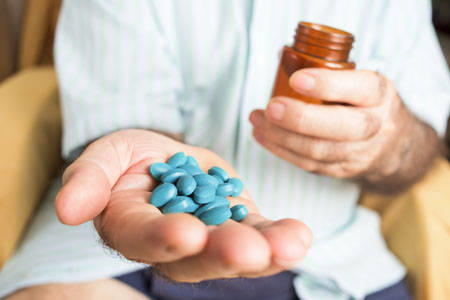Salvia Treatment and Rehab
Salvia Info
Also known as ‘sage of the diviners’, Salvia is a plant with green leaves and psychoactive properties. It is chewed, smoked or processed into tea for the ‘high’ induced from its hallucinogenic effects. Over the centuries, Salvia has been used for its ceremonial and recreational purposes and grown mainly in Mexico. It was also used as a religious ingredient for healing, as Salvia is said to expand consciousness during the healing process.
There has been insufficient research to date with regards what determines the substance’s toxicity, but its immediate effect is cause for concern. Psychological addiction to Salvia is predominant amongst teenagers and can manifest rapidly.
What is Salvia addiction?
Salvia is a new substance abuse trend and predominately used by teens. In fact, studies show that Salvia is used by twelve year olds (and upwards), which is mainly due to its current legal status.
Salvia addiction develops due to the manner in which the substance induces its ‘high’ effect. Subsequently, it produces psychedelic effects in the form of hallucinations. These hallucinations affect changes in the senses and also the person’s mood, with the user being immediately dislodged from reality. This is why constant Salvia users – especially teens – find social interaction difficult.
There is no scientific proof of physical addiction to Salvia, which results in dependency of the brain for the production of neurochemicals. However, constant use will lead to abuse and psychological addiction, due to the drug’s appeal to teens.

Warning signs of Salvia Abuse and Addiction
The onset of addiction can happen very quickly. You may think that you’re still in control and are using Salvia for merely recreational purposes – or you’ve convinced yourself that you can stop any time you want. You might even have set a date to quit by including it in your new year’s resolution or birthday. However, you’ll soon realise that you’re not able to. At this point, you could start hiding your symptoms from friends, family or colleagues, so that you’re not labelled an addict. The best practice with abuse and addiction is to detect its warning signs early on and seek help. Some signs to look out for include:
- Slurred speech: loved ones will be able to detect this. Salvia induces slurred speech – a similar characteristic to that of alcohol intoxication.
- Loss of coordination: the person begins staggering and cannot maintain steady hands.
- Stuttering: the user is not able to make coherent sentences.
- Nausea: incessant nausea will accompany consistent use of Salvia.
- Slow heart rate: Salvia is known to noticeably slow down a user’s heart rate.
- Hallucinations: the user’s vision will also be distorted.
- Sweatiness
- Chills
- Uncontrollable laughter
Call our admissions line 24 hours a day to get help.
Effects: Short and Long-Term
Though it’s still a legal substance, Salvia has some short and long-term effects on the body and mind. Although these effects don’t linger long, they are relatively intense and consequently, unpleasant.
Short-Term Effects
- Loss of coordination
- Fear
- Panic
- Nausea
- Hallucinations
- Uncontrollable laughter
- Feelings of detachment
- Deteriorating interpersonal skills
- Mood swings
- Distorted sensory perceptions
Long-Term Effects
- Personality shift
- Severe depression
- Flashbacks: these occur even when one the user is not consuming Salvia and induces effects similar to ‘tripping’.
- Schizophrenia
- Financial crisis
- Loss of connection with reality
Call our admissions line 24 hours a day to get help.
Why You Should Seek Rehab for Salvia Abuse and addiction
Salvia is still a relatively new psychoactive drug, as not much research has gone into fully understanding it. The lack of knowledge with regards its toxicity is good enough reason to seek help immediately after you begin exhibiting signs of addiction. You could be easily deceived by its legal status and the shortness of the associated ‘trip’, but Salvia’s long-term usage can cause brain damage and result in schizophrenia if not attended to immediately.

It could also lead to memory loss, learning and speech impairment, motor damage, severe depression and anxiety, which each have their own effects on the mind.
Emotionally, the mood swings, depression and anxiety caused by Salvia abuse are capable of creating a personality shift and an inability to interact socially, so that the user isolates themselves from friends, family and colleagues or peers. This has a direct effect on their development and sense of self-worth.
As mentioned earlier, it’s best to seek immediate help for the treatment of Salvia abuse, so that the situation does not deteriorate to the point of being deadly. If you notice a friend exhibiting warning signs of Salvia abuse and addiction, you should act accordingly and get them to seek professional help.
What is Salvia Rehab Like?
Rehab is designed to suit the substance addiction it’s treating. Different rehab facilities emphasise certain aspects of the treatment process and deploy them according to the addiction in question.
Rehab centres seek to not only achieve abstinence on the patient’s part, but also a holistic reclaiming of their mind, body and control. This is because Salvia abuse eats into both a person’s personality and body.
You can find some gender specific centres, where only men or women are admitted. This will allow patients to better relax and open up, which is an important factor in addiction treatment. In most cases, therapists are of the same gender as patients.
You can also expect to undertake family and community group sessions. With the former, a patient’s family and loved ones are invited during inpatient therapy. This aims to encourage the patient to express their emotions to those closest to them. One of the major causes of abuse is a need to escape personal issues, for which the patient’s family might be a contributory factor. Meanwhile, community groups will work on the patient’s social interactions and immerse them back into society, from which addiction isolated them initially.
There are also psychotherapeutic sessions, which address the patient’s psychological needs. This is mostly carried out on a personal basis, where one therapist or psychiatrist attends to a single patient.
Treatment and Therapy Options
Currently, there are no specifically designed treatment and therapy options for Salvia addiction. However, different rehabilitation centres design their own treatment – oh which, some of the more popular methods will be discussed below:
- Inpatient therapy: this is the most common treatment option. Patients are provided 24-hour treatment in a rehab facility. This may last for months and all drugs and treatment activities are administered in the same facility, until the patient starts showing signs of recovery.
- Outpatient therapy: this option is best for those who cannot take an extended break from family and work commitments that inpatient therapy requires.
Types of Salvia Addiction Treatment
- Wilderness therapy: this is an outdoor therapy option, which includes games and other activities involved in treating addiction. They include rope climbing, mission games and all kinds of activities that feature some psychotherapeutic benefit for the patient to aid their recovery. Whilst patients partake in these physical activities, therapists then engage them verbally to improve their behaviour. Some rehab centres refer to this option as adventure therapy.
- Private and confidential therapy: this option is open to those who need treatment, but don’t want anyone else to know. This is a perfect option for those with sensitive jobs and a reputation to uphold.
- Evidence based therapy: this method focuses on scientifically proven methods that work. A psychotherapist selects remedies that have high success rates and applies them in treatment.
- Experiential: this option encourages the patient to look deep into themselves to identify their problems. It involves verbal assistance from therapists, as well as some visualisation.
When to choose: inpatient vs. outpatient

Choosing to get help for addiction is a huge step in the right direction, but a long and arduous journey lies ahead. Deciding which treatment option to undertake is integral to the healing process. Both options have their pros and cons. Ideally, the perfect treatment option is inpatient therapy, as therapists are able to monitor you closely and you’ll receive the full care and attention you deserve. Also, it will keep you away from any of your peers who might encourage you to keep using Salvia. This could serve as a distraction if you choose outpatient therapy.
On the other hand, inpatient therapy can be too much of a price to pay if you work in a job that requires constant attention. Inpatient therapy requires you to be disconnected from your job, family and friends for a while. This could be for a month or even three months and can be extended if it’s found you need more time. These are the factors you have to consider before deciding which option is best for you.
Call our admissions line 24 hours a day to get help.
Choosing the Best Salvia Rehab Centre
Just like deciding which treatment option is best for you, you’ll also have to choose the most appropriate type of rehab centre. Other factors to be considered include cost and distance. The ideal option is usually the one closest to you, as this will afford easy access for follow-ups after your inpatient rehabilitation period has come to a close. It will also be easier for family to pay visits. However, most people prefer centres far away from their home and workplace, so that they can enjoy some level of privacy and not be seen by people they know. This is also beneficial in that it keeps the patient away from factors that could instigate a relapse.
Aftercare
Even after the rehabilitation process, there is need for follow-up care. A drug like Salvia is potent and has a resounding effect on the mind and body. The goal of aftercare is to prevent situations that might lead to a relapse; to encourage a smooth transition back into society; and also the active participation of the patient within their community. It will also help solidify the healing process. A good rehabilitation centre will provide aftercare programmes and patients should take it as seriously as they did rehab.
Relapse Prevention
Relapse is common in Salvia addiction treatment. To prevent it, follow the aftercare programmes stringently. Also, strive not to associate with any people that previously encouraged your Salvia abuse.
Salvia Addiction Facts
- There is no proof yet that Salvia is toxic
- A Salvia ‘trip’ begins within 60 seconds after it is smoked and lasts barely up to 30 minutes
- The active ingredient in Salvia is called Salvinorin
- Salvia is not physically addictive, but one can develop a psychological addiction to it
FAQs
What are the street Names for Salvia?
- Sage of the seers
- Magic mint
- Sally D
- Sister Salvia
- Lady Salvia
- Purple sticky
Are Salvia Rehab Centres Private and Confidential?
Yes. Your information is protected by patient- therapist confidentiality policies.
Is Salvia Addictive?
Salvia is not physically addictive, but prolonged use can develop a habit whereby the user feels compelled to consume it.
How long does rehab take?
An average of 30 months.
What Types Of Salvia Addiction Treatment Programmes Are Available?
Inpatient and outpatient treatment programmes.
Is there an ideal length of rehab?
The idea length is 60 days, plus aftercare programmes.
What Does Treatment Include?
- Detoxification
- One-on-one psychotherapy sessions
- Group sessions
- Group tasks
- Family sessions
- Outdoor activities
- Monitored withdrawal period
Are There Treatment Programmes for Teens?
Yes, there are numerous treatment programmes for teens struggling with Salvia addiction.
How Do You Know if You’re Addicted to Salvia?
A Diagnosis will be conducted by a professional, but once a behavioural change occurs that encourages the use of Salvia, you should seek help. Also, mood swings, anxiety and nausea are major signs of Salvia addiction.
Call our admissions line 24 hours a day to get help.

